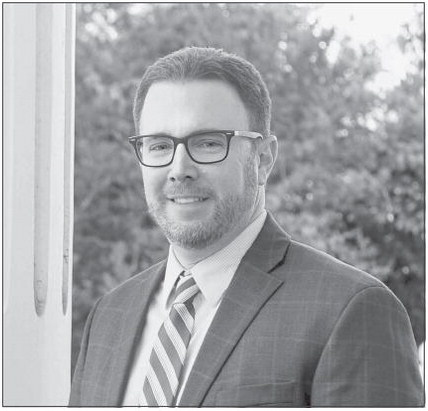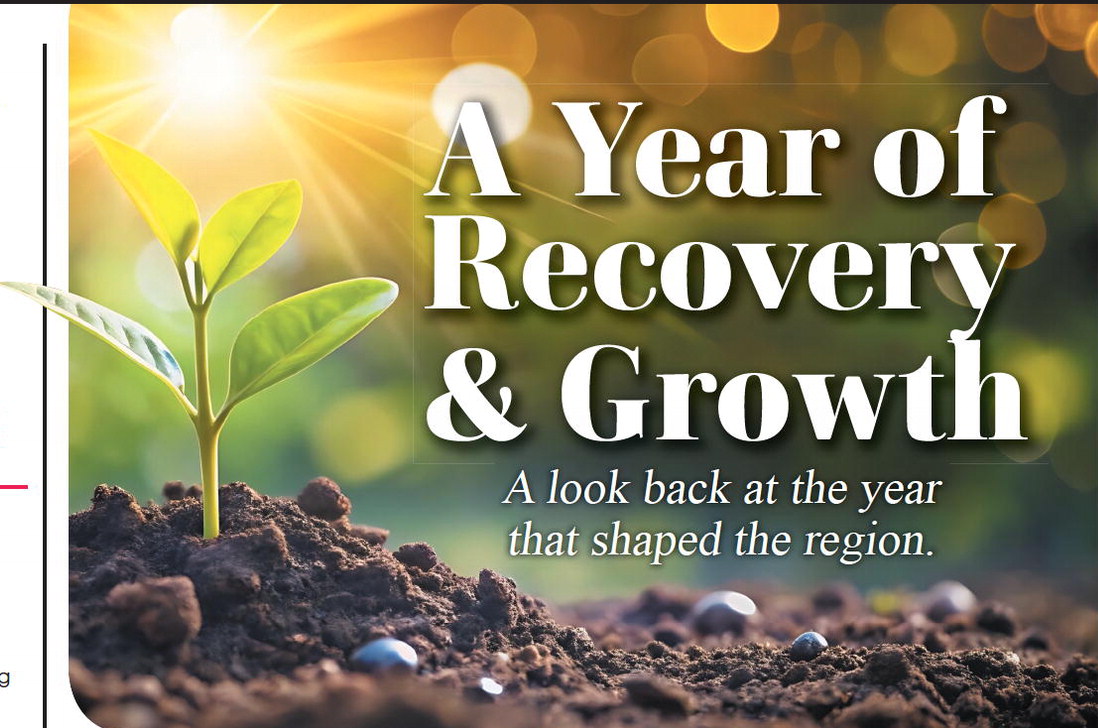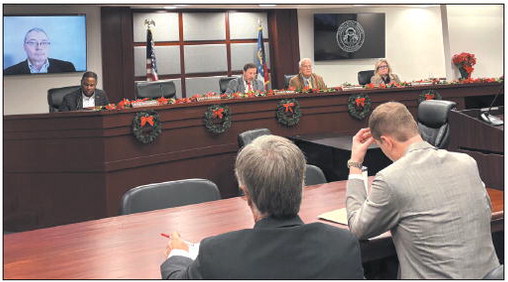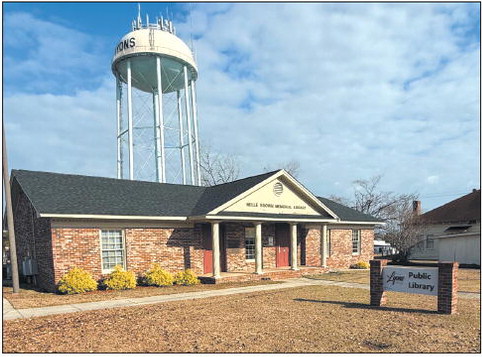Hearings Over HB581 Opt-Out Slated in Wheeler County


Public hearings will be held next week in Wheeler County to gather local input on opting out of the controversial House Bill 581. Also known as the “Save Our Homes Act,” HB581 was passed last year by the General Assembly and approved by 63% of Georgia voters in a November referendum.
The measure creates three major components related to property taxes: a statewide floating homestead exemption; a new local option sales tax; and procedural property taxes. The bill was signed into law on April 18, 2024, but was contingent on the passage of continued from page
an amendment to the State Constitution, which voters approved in the November referendum. The measure went into effect statewide on January 1, but its passage may not guarantee it is put into motion in every county.
Any local government entity is allowed to opt out of the bill, but the choice must be made in the form of a resolution by March 1. Participation in the measure requires no action — inclusion is automatic; but if a local entity opposing participation misses the firm deadline to opt out, there is no future provision for doing so. In order to opt out of the law, local governments and school boards must hold three public hearings, pass a resolution and submit it to the Secretary of State by the deadline. For entities that wish to reverse their decisions, the bill provides that the local delegation may pass a local Act of the General Assembly to implement a local floating homestead exemption at any time.
The decision to opt out is independent among local governments. A county, city, or school board may each decide whether to opt out. The decision of whether or not to opt out will not impact the other local government’s homestead exemptions, but this may result in homes having different taxable values.
In Wheeler County, the referendum passed with a vote of 60.53%, but some local officials wonder whether citizens realized what they were supporting when they voted yes on what many contend is confusing language in the measure.
“This is just not a good fit for Wheeler County,” said Commission Chairman Keith McNeal. “We would have to generate the same amount of money by raising the millage to offset the loss in property taxes,” he explained, adding, money saved by local homeowners in the near future could adversely impact the community over the long haul, resulting in raising millage rates, which would not be popular.
Wheeler County will hold two of three required public hearings on February 20, at 5 p.m., and at 6 p.m. The third hearing will be held on February 21 at 9 a.m. The hearings will be held in the County Commission meeting room at the Community Center on Forest Avenue in Alamo. The City of Glenwood will hold public hearings on Thursday, February 20, at noon and 6:30 p.m., and on Tuesday, February 25, at noon, at City Hall, 20 NW Third Avenue in Glenwood. The City of Alamo will hold three public hearings at City Hall, 7 West Main Street in Alamo, on Thursday, February 20, at 4 p.m. and 6 p.m., and on Friday, February 21 at 10 a.m.
The Wheeler County Board of Education has already held two of the three public hearings. The third hearing was set for February 10, the date of the board’s next regular session.
A long — and growing — list of governmental entities are deciding to opt out of the Georgia bill that would freeze property assessment at the rate of inflation. They offer different reasons. “In order to maintain the level of educational services, we would continue to raise the millage rate,” Oglethorpe County School Superintendent Beverley Levine said in a story posted in the Oglethorpe Echo. “We do not want folks in Atlanta determining what is best for Oglethorpe County.”
But in Montgomery County, one resident said the decision to enact the exemption was already made by the voters. 'I’m here today to say, as one taxpayer, I’m offended that it’s even being considered because it has a lot of implications that can be worked around besides just stamping it and saying, ‘yep, we’re going to raise it. We’re going to opt out and do what we want to do,’” K.C. Seabury said in an article published in The Advance.
Some lawmakers, like Sen. Chuck Hufstetler, R-Rome, are considering legislation to remove the opt-out option. Rather than introducing a bill that would mandate the tax break statewide, it will be a trend among lawmakers to introduce bills specific to their counties where entities are opting out, he told The Center Square, an online news service. The bills would be introduced in the Senate's State and Local Government Operations Committee.
For homeowners, House Bill 581 promises tax relief while maintaining the market value of their property. Whatever their property taxes are valued in 2024 will remain constant so long as they live at and own the property (with a few stipulations).
A House Budget and Research Office flier from July 2024 explains: “HB 581 provides a statewide ‘floating’ homestead exemption that will limit annual assessment increases on a homesteaded property to the rate of inflation.”
The Georgia Department of Revenue will set the annual rate of inflation based on the consumer price index. So, property taxes will rise only with inflation until the house is sold to a new owner and a new tax assessment is conducted (or if substantial changes are made to the property). This would create a degree of tax certainty for homeowners, ensuring they can anticipate the coming years’ taxes cost more confidently.
But some local governments are arguing that while this appears to cut the homeowner a break, freezing property taxes could adversely impact projected tax revenue — perhaps by millions of dollars of deficit in the future.
A number of school boards (some 80%) are now opting out, according to the Georgia School Superintendents Association. These school systems foresee that the repercussions of the law could affect future class sizes, staffing and employee retention and facility maintenance. Many of the school boards have expressed concerns that a hefty income loss would require implementing counteractive measures like raising the millage rate, which would likely create local backlash.
Wheeler County Schools Superintendent Dr. C. Alex Alvarez noted, “Wheeler County Schools' decision to opt out of House Bill 581, which proposes a statewide floating homestead exemption, reflects a strategic approach to maintain local control over its tax digest. By opting out, the school system aims to avoid being subjected to a statewide inflation average for property values that could impact their ability to address local inflation rates and specific needs in the future.”
He added, “This choice allows Wheeler County to have more flexibility in managing its tax revenue, ensuring that the funds are allocated in ways that directly benefit students and meet the community's needs. With the existing homestead exemption program remaining in place, the district can continue to make decisions about millage rates and taxes in alignment with their long-term goals, rather than relying on a statewide system that may not accurately reflect local conditions.”
The Superintendent pointed out that this move demonstrates a focus on safeguarding financial stability and long-term strategic planning needed to support the county's educational priorities, even as future challenges with the tax digest and inflation may arise.
According to a handout from the state Superintendent’s Association, which was shared by Dr. Alvarez with the Wheeler County school board, “Many school districts have existing property tax exemptions already in place (senior exemption, land use exemptions, Carter Burns, etc.) These exemptions likely will have a substantial impact on taxable property. A statewide restriction could have a compounding impact on the levying capacity for school districts. By opting out, the local districts retain the ability to access the needed revenue to meet their future financial obligations.”
Bibb County Superintendent Dan Sims told WMAZ-TV in Macon, opting into the bill would cost the school system substantially in the long run.
'I believe it's 50 years, like it is a long-term commitment, and the financial implications on the district are not good,” Sims said. “Specifically, we already did research going back to 2018 to show if we were to have opted in to this kind of bill from 2018 to the present, it would have cost us upwards of $3.7 million. That would have been less money towards our needs as a school district.'
Houston County School District, which replied to the news station by sending a prepared statement, said they can't afford to opt in either because House Bill 581 will limit how much property owners are taxed but not the share the state collects from their millage rate revenue.
“School districts are unique in that the value of our local property tax assessments directly affects the amount of funding that we receive from the State of Georgia. HB581 results in a floating homestead exemption that will limit the value for property owners but will not limit the value of the 5 mill share withheld from school districts by the state. Because the state withholds the equivalent of 5 mills of assessed property values, HB581 could both reduce the amount of funding we are able to collect, while at the same time increase the amount the state withholds from our state funding. If the value of a mill increases in Houston County, our school district will be required to contribute more to the state than we would be allowed to collect because of the HB581 cap.”
And the housing market could also suffer. The Tax Foundation points out that the bill could affect the housing market. 'There would be a significant disincentive for current homeowners to sell their homes since they will experience the full force of assessments based on higher prices in the real estate market,' the organization said in an October 2024 analysis. 'Likewise, prospective homebuyers in 2025 and beyond will have a harder time accessing housing that fits their current budgets due to the unwillingness of current homeowners to list their houses on the market, and the disincentives this policy creates for new construction.'
“With the existing homestead exemption program remaining in place, the district can continue to make decisions about millage rates and taxes in alignment with their long-term goals, rather than relying on a statewide system that may not accurately reflect local conditions."
— Dr. C. Alex Alvarez






